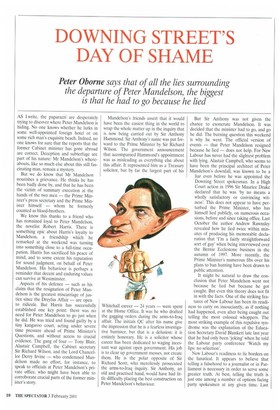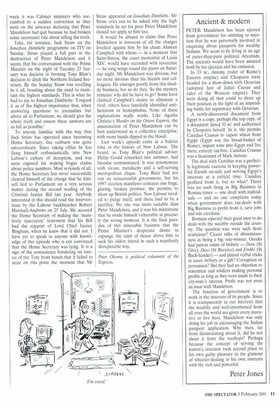DOWNING STREET'S DAY OF SHAME
Peter °borne says that of all the lies surrounding
the departure of Peter Mandelson, the biggest is that he had to go because he lied
AS I write, the paparazzi are desperately trying to discover where Peter Mandelson is hiding. No one knows whether he lurks in some well-appointed foreign hotel or on some rich man's exquisite beach. Indeed, no one knows for sure that the reports that the former Cabinet minister has gone abroad are correct. Deception and subterfuge are part of his nature: Mr Mandelson's whereabouts, like so much else about this still fascinating man, remain a mystery.
But we do know that Mr Mandelson nourishes a grievance. He thinks he has been badly done by, and that he has been the victim of summary execution at the hands of the two men — the Prime Minister's press secretary and the Prime Minister himself — whom he formerly counted as blood-brothers.
We know this thanks to a friend who has remained loyal to Peter Mandelson, the novelist Robert Harris. There is something epic about Harris's loyalty to Mandelson, a friendship which he remarked at the weekend was turning into something close to a full-time occupation. Harris has sacrificed his peace of mind, and to some extent his reputation for sound judgment, on behalf of Peter Mandelson. His behaviour is perhaps a reminder that decent and enduring values can survive at Westminster.
Aspects of his defence — such as his claim that the resignation of Peter Mandelson is the greatest miscarriage of justice since the Dreyfus Affair -are open to ridicule. But Harris has successfully established one key point: there was no need for Peter Mandelson to go just when he did. He was tried and found guilty by a tiny kangaroo court, acting under severe time pressure ahead of Prime Minister's Questions, and without access to crucial evidence. The gang of four — Tony Blair, Alastair Campbell, the Cabinet secretary Sir Richard Wilson, and the Lord Chancellor Derry Irvine — who condemned Mandelson made no effort, for instance, to speak to officials at Peter Mandelson's private office, who might have been able to corroborate crucial parts of the former minister's story. Mandelson's friends assert that it would have been the easiest thing in the world to wrap the whole matter up in the inquiry that is now being carried out by Sir Anthony Hammond. Sir Anthony's name was put forward to the Prime Minister by Sir Richard Wilson. The government announcement that accompanied Hammond's appointment was as misleading as everything else about this affair. It represented him as a Treasury solicitor, but by far the largest part of his Whitehall career — 24 years — were spent at the Home Office. It was he who drafted the gagging orders during the arms-to-Iraq affair. The initials QC after his name give the impression that he is a fearless investigative barrister, but that is a delusion: it is entirely honorary. He is a solicitor whose career has been dedicated to waging incessant war against open government. His job is to clear up government messes, not create them. He is the polar opposite of Sir Richard Scott, who mercilessly prosecuted the arms-to-Iraq inquiry. Sir Anthony, an old and practised hand, would have had little difficulty placing the best construction on Peter Mandelson's behaviour. But Sir Anthony was not given the chance to exonerate Mandelson. It was decided that the minister had to go, and go he did. The burning question this weekend is why he went. The official version of events — that Peter Mandelson resigned because he lied — does not help. For New Labour has never had the slightest problem with lying. Alastair Campbell, who seems to have been the principal architect of Peter Mandelson's downfall, was known to be a liar even before he was appointed the Downing Street spokesman. In a High Court action in 1996 Sir Maurice Drake declared that he was by no means a wholly satisfactory or convincing witness'. This does not appear to have perturbed the Prime Minister, who has himself lied publicly, on numerous occasions, before and since taking office. Last October the author Andrew Rawnsley revealed how he lied twice within minutes of producing his memorable declaration that 'I'm a fairly straightforward sort of guy' when being interviewed over the Bernie Ecclestone business in the autumn of 1997. More recently, the Prime Minister's numerous fibs over his plans to ban hunting have been drawn to public attention.
It might be natural to draw the conclusion that Peter Mandelson went not because he lied but because he got caught. But even this theory does not fit in with the facts. One of the striking features of New Labour has been its readiness to carry on insouciantly, as if nothing had happened, even after being caught out telling the most colossal whoppers. The most striking example of this repulsive syndrome was the explanation of the Education Secretary David Blunkett late last year that he had only been 'joking' when he told the Labour party conference 'Watch my lips: no selection'.
New Labour's readiness to lie borders on the fanatical. It appears to believe that telling a falsehood to a journalist or in Parliament is necessary in order to serve some greater truth. At best, telling the truth is just one among a number of options facing party spokesmen at any given time. Last week it was Cabinet ministers who succumbed to a sudden conversion as they went on the airwaves declaring that Peter Mandelson had quit because he had broken some sacrosanct rule about telling the truth.
Take, for instance, Jack Straw on the Jonathan Dimbleby programme on ITV on Sunday. Straw played a full part in the destruction of Peter Mandelson and it seems that his conversation with the Prime Minister on the night of Tuesday 23 January was decisive in forming Tony Blair's decision to ditch the Northern Ireland Secretary. By the Sunday Straw was revelling in it all, boasting about the need to maintain the highest standards. This is what he had to say to Jonathan Dimbleby: 'I regard it as of the highest importance that, when answering questions to journalists but above all to Parliament, we should give the whole truth and ensure these answers are as full as possible.'
To anyone familiar with the way that Jack Straw has operated since becoming Home Secretary, this outburst was quite extraordinary. Since taking office he has flung himself enthusiastically into New Labour's culture of deception, and was soon exposed for making bogus claims about police numbers. Most seriously of all, the Home Secretary has never successfully cleared himself of the charge that he himself lied to Parliament on a very serious matter during the second reading of the Criminal Justice Bill last year. Anybody interested in this should read the interventions by the Labour backbencher Robert Marshall-Andrews on 25 July. He accused the Home Secretary of making the 'manifestly inaccurate' statement that his Bill had the support of Lord Chief Justice Bingham, when he knew that it did not. I have yet to speak to anyone with knowledge of this episode who is not convinced that the Home Secretary was lying. It is a sign of the somnolence bordering on inertia of the Tory front bench that it failed to seize on this point the moment that Mr
Straw appeared on Jonathan Dimbleby. Mr Straw cries out to be asked why the high standards he set for poor Peter Mandelson should not apply to him too.
It would be absurd to claim that Peter Mandelson is innocent of all the charges levelled against him by his chum Alastair Campbell with whom — in a moment that Saint-Simon, the court memoirist of Louis XIV, would have recorded with reverence — he sang songs round the piano on Saturday night. Mr Mandelson was devious, but no more devious than his friends and colleagues. He emerges poorly from this shoddy business, but so do they. So the mystery remains: why did he have to go? Some have claimed Campbell's desire to eliminate a rival; others have fancifully identified antiSemitism or homophobia. None of these explanations really works. Like Agatha Christie's Murder on the Orient Express, the assassination of Peter Mandelson can be best understood as a collective enterprise, with many hands dipped in the blood.
Last week's episode came at a baleful time in the history of New Labour. The brand, as Tony Blair's political adviser Philip Gould remarked last summer, had become contaminated. It was synonymous with sleaze, mendacity and a self-serving metropolitan clique. Tony Blair had not run an unsuccessful government, but his 1997 election manifesto contains one huge, glaring, broken promise: the promise to clean up British politics. New Labour needed to purge itself, and there had to be a sacrifice. No one was more suitable than Peter Mandelson, and it was his misfortune that he made himself vulnerable at precisely the wrong moment. It is the final paradox of this miserable business that the Prime Minister's desperate desire to expunge the taint of sleaze drove him to sack his oldest friend in such a manifestly disreputable way.
Peter Obome is political columnist of the Express.



























































 Previous page
Previous page